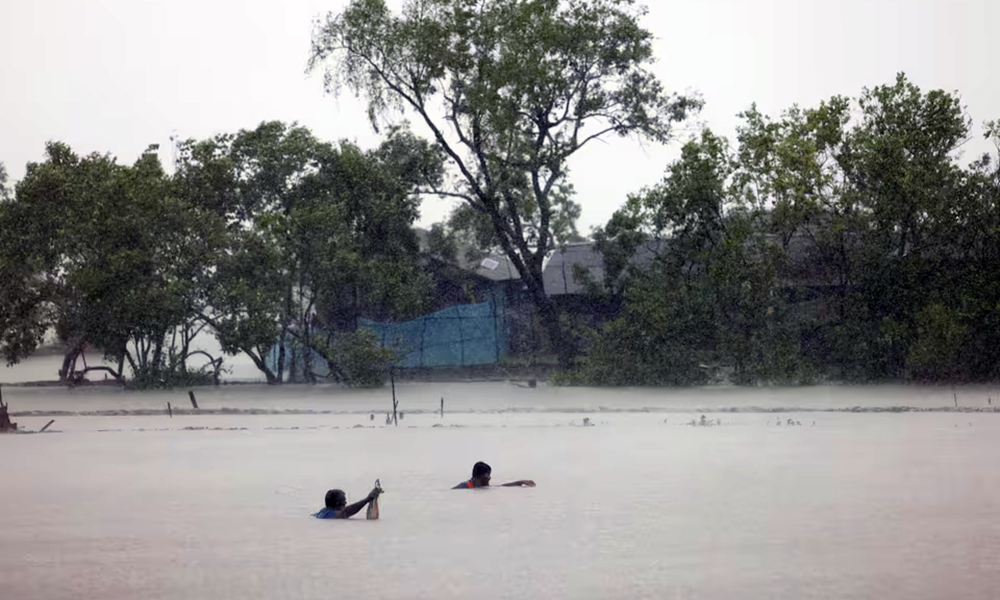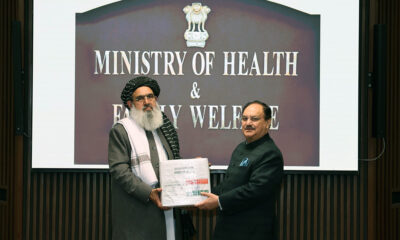Climate Change
Cyclone kills 16 in India, Bangladesh and cuts power to millions

Strong gales and heavy rain triggered by the first major cyclone of the year lashed the coastlines of India and Bangladesh on Monday, killing at least 16 people and cutting power to millions.
The winds had not stopped as night fell, with water rising in many places and overwhelming drainage systems, Bangladeshi climate expert Liakath Ali said.
“Many people are stranded – it will be another long night ahead with millions not having electricity or shelter,” he said in a statement. “And people having no idea of how damaged their homes, land and livestock are.”
Cyclone Remal is the first of the frequent storms expected to pound the low-lying coasts of the South Asian neighbors this year as climate change drives up surface temperatures at sea, Reuters reported.
Packing speeds of up to 135 kph, it crossed the area around Bangladesh’s southern port of Mongla and the adjoining Sagar Islands in India’s West Bengal late on Sunday, weather officials said, making landfall at about 9 p.m.
More than 8.4 million people, including 3.2 million children, are at high health, nutrition, sanitation and safety risk, said Sheldon Yett, UNICEF Representative to Bangladesh.
At least 10 people were killed in Bangladesh, disaster management chief Mijanur Rahman told Reuters, adding some victims died en route to shelters or when their homes or walls collapsed, or drowned during the storm.
“People are usually very reluctant to leave their livestock and homes to go to cyclone shelters,” he said. “They wait until the last minute when it is often too late.”
State Minister for Disaster Management and Relief Mohibbur Rahman said the cyclone destroyed nearly 35,000 homes across 19 districts. An additional 115,000 homes were partially damaged.
In India’s West Bengal state, four people were electrocuted, authorities said, taking the death toll in the state to six.
Bangladesh shut down electricity supply to some areas in advance to avoid accidents, while in many coastal towns fallen trees and snapped electricity lines further disrupted supply, power ministry officials said.
Nearly 3 million people in Bangladesh were without electricity, officials added. West Bengal authorities said at least 1,200 power poles were uprooted, while 300 mud huts had been razed.
Flooded roads disrupted travel in the Bangladeshi capital of Dhaka. Rain also flooded many streets in the Indian city of Kolkata, with reports of wall collapses and at least 52 fallen trees.
Kolkata resumed flights after more than 50 were cancelled from Sunday. Suburban train services were also restored.
Both nations moved nearly a million people to storm shelters, about 800,000 in Bangladesh and roughly 110,000 in India, authorities said.
Climate Change
Fire disrupts COP30 climate talks as UN chief urges deal

Talks at the COP30 climate summit in Brazil were disrupted on Thursday after a fire broke out in the venue, triggering an evacuation just as negotiators were hunkering down to try to land a deal to strengthen international climate efforts.
United Nations Secretary-General Antonio Guterres had appealed earlier in the day for a deal from the summitin the Amazon city of Belem, welcoming calls from some for clarity on the hotly disputed subject of weaning the world off fossil fuels, Reuters reported.
There are less than 24 hours until the scheduled end of the summit to find a consensus among nearly 200 participating countries. Host nation Brazil has framed a deal as a crucial step towards ramping up international climate action and demonstrating that there is broad support to accelerate turning decades of promises and pledges from COP summits into action.
Shortly after lunchtime, however, security footage showed flames breaking out at an exhibition pavilion and spreading rapidly up an internal fabric shell that lined the walls and ceiling of the building, before being extinguished.
Thirteen people were treated for smoke inhalation at the venue, organizers said. The local fire service said it was probably caused by electrical equipment, likely a microwave, and was controlled within six minutes.
Thousands of delegates were evacuated as security staff formed a human barrier across the hallway.
DRAFTING DOCUMENTS, DEADLINES MISSED
Negotiations were not expected to resume until Friday morning, a source told Reuters. Consultations between the presidency and negotiating blocs could continue on Thursday night, subject to safety assessments at the venue.
The summit already missed a self-imposed Wednesday deadline to secure agreement among the countries present on issues including how to increase climate finance and shift away from fossil fuels.
Brazil circulated a draft proposal for part of the COP30 deal among some governments on Thursday, which did not include a roadmap on transitioning away from fossil fuels.
Emissions from burning fossil fuels trap heat in the earth’s atmosphere and are by far the biggest contributor to warming.
The draft proposal, seen by Reuters, included other elements for a deal. It said countries would call to triple the financing available to help nations adapt to climate change by 2030, from 2025 levels. However, it did not specify whether this money would be provided directly by wealthy governments, or other sources including development banks or the private sector.
Brazil’s COP30 presidency did not immediately respond to a request for comment on the draft text.
Some negotiators said they had been working on the draft text shortly before the COP venue was evacuated due to the fire. Others said it had not been shared with them.
It is common at COP summits for the presidency to thrash out a text with small groups of countries, before bringing all governments together to greenlight the final deal.
FOSSIL FUEL RIFT
The two-week negotiation has become hung up on two issues – the future of fossil fuels and the delivery of climate finance – that expose criss-crossing fault lines between negotiating blocs from rich Western countries, oil producers and smaller states most vulnerable to climate change.
Taking their cue from Brazil, dozens of countries including both developed and developing nations have mounted a push for a roadmap setting out how countries should transition away from fossil fuels.
Others, including some fossil fuel-producing nations, are resisting.
The COP28 climate summit in 2023 agreed, after protracted discussion, to a transition, but nations have not mapped out how – or when – it will happen.
“I am perfectly convinced that a compromise is possible,” Guterres said.
ADAPTING TO CHANGE
Another major sticking point in the negotiations is a reluctance among some richer nations to guarantee financing to help poorer countries adapt to a changing climate, according to three sources involved in the talks.
Developing countries are already deeply mistrustful of a $300 billion climate finance pledge made last year at the COP29 conference in Baku, particularly as the United States withdraws from climate cooperation under President Donald Trump.
Some existing climate finance has been directed to strange projects, including some that are funneling billions of dollars back to rich nations, according to previous Reuters reporting.
“Right now, our people are losing their lives and livelihoods from storms of unprecedented strength which are being caused by warming seas,” said Steven Victor, Minister of Agriculture, Fisheries and the Environment for the Pacific island nation of Palau.
“If we leave Belem without a transformative outcome on adaptation for the world’s most vulnerable, it will be a failure,” he said.
European officials have said they agree adaptation financing is important, but that they were not authorized to agree to new targets.
Climate Change
Tehran taps run dry as water crisis deepens across Iran

Iran is grappling with its worst water crisis in decades, with officials warning that Tehran — a city of more than 10 million — may soon be uninhabitable if the drought gripping the country continues.
President Masoud Pezeshkian has cautioned that if rainfall does not arrive by December, the government must start rationing water in Tehran, Reuters reported.
The stakes are high for Iran’s clerical rulers. In 2021, water shortages sparked violent protests in the southern Khuzestan province. Sporadic protests also broke out in 2018, with farmers in particular accusing the government of water mismanagement.
WATER PRESSURE REDUCTIONS BEING APPLIED
The water crisis in Iran after a scorching hot summer is not solely the result of low rainfall.
Decades of mismanagement, including overbuilding of dams, illegal well drilling, and inefficient agricultural practices, have depleted reserves, dozens of critics and water experts have told state media in the past days as the crisis dominates the airwaves with panel discussions and debates.
Pezeshkian’s government has blamed the crisis on various factors such as the “policies of past governments, climate change and over-consumption”.
While there has been no sign of protests yet this time over the water crisis, Iranians are already struggling under the weight of a crippled economy, chiefly because of sanctions linked to the country’s disputed nuclear programme.
Coping with persistent water shortages strains families and communities even further, intensifying the potential for unrest, when the clerical establishment is already facing international pressure over its nuclear ambitions. Iran denies seeking nuclear weapons.
Across Iran, from the capital’s high-rise apartments to cities and small towns, the water crisis is taking hold.
When the taps went dry in her eastern Tehran apartment last week, Mahnaz had no warning and no backup.
“It was around 10 p.m., and the water didn’t come back until 6 a.m.,” she said. With no pump or storage, she and her two children were forced to wait, brushing teeth and washing hands with bottled water.
Iran’s National Water and Wastewater Company has dismissed reports of formal rationing in Tehran, but confirmed that nightly water pressure reductions were being applied in Tehran and could drop to zero in some districts, state media reported.
Pezeshkian also warned against over-consumption in July. The water authorities said at the time 70% of Tehran residents consumed more than the standard 130 litres a day.
TEHRAN’S RESERVOIRS AT AROUND HALF CAPACITY
Iranians have endured recurrent electricity, gas and water shortages during peak demand months in the past years.
“It’s one hardship after another — one day there’s no water, the next there’s no electricity. We don’t even have enough money to live. This is because of poor management,” said schoolteacher and mother of three Shahla, 41, by phone from central Tehran.
Last week, state media quoted Mohammadreza Kavianpour, head of Iran’s Water Research Institute, as saying that last year’s rainfall was 40% below the 57-year average in Iran and forecasts predict a continuation of dry conditions towards the end of December.
The capital depends entirely on five reservoirs fed from rivers outside the city. But inflow has plummeted. Behzad Parsa, head of Tehran’s Regional Water Company, said last week that water levels had fallen 43% from last year, leaving the Amir Kabir Dam at just 14 million cubic meters — 8% of capacity.
He said Tehran’s reservoirs, which collectively could once store nearly 500 million cubic meters, now hold barely 250 million, a drop of nearly half, which at current consumption rates, could run dry within two weeks.
The crisis extends far beyond Tehran. Nationwide, 19 major dams — roughly 10% of Iran’s total — have effectively run dry. In the holy Shi’ite city of Mashhad, Iran’s second-largest city, with a population of 4 million, water reserves have plunged below 3%.
“The pressure is so low that literally we do not have water during the day. I have installed water tanks but how long we can continue like this? It is completely because of the mismanagement,” said Reza, 53, in Mashhad. He said it was also affecting his business of carpet cleaning.
Like the others Reuters spoke to, he declined to give his family name.
CLIMATE CHANGE INTENSIFIED WATER LOSS
The crisis follows record-breaking temperatures and rolling power outages. In July and August, the government declared emergency public holidays to reduce water and energy consumption, shutting down some public buildings and banks as temperatures topped 50 degrees Celsius (122 degrees Fahrenheit) in some areas.
Climate change has intensified the problem, authorities say, with rising temperatures accelerating evaporation and groundwater loss.
Some newspapers have criticized the government’s environmental policies, citing the appointment of unqualified managers and the politicization of resource management. The government has rejected the claims.
Calls for divine intervention have also resurfaced.
“In the past, people would go out to the desert to pray for rain,” said Mehdi Chamran, head of Tehran’s City Council, state media reported. “Perhaps we should not neglect that tradition.”
Authorities are taking temporary measures to conserve what remains, including decreasing the water pressure in some areas and transferring water to Tehran from other reservoirs.
But these are stopgap measures, and the public has been urged to install storage tanks, pumps, and other devices to avoid major disruption.
“Too little, too late. They only promise but we see no action,” said a university teacher in the city of Isfahan, who asked not to be named. “Most of these ideas are not doable.”
Climate Change
Afghanistan excluded from UN Climate Change Conference in Brazil

The National Environmental Protection Agency (NEPA) of Afghanistan has voiced concern over the country’s exclusion from the upcoming international climate change conference in Brazil, despite Afghanistan being one of the most vulnerable nations to climate impacts. The conference is scheduled to begin tomorrow (Monday).
In an official statement, NEPA emphasized that, with a coordination mechanism and a comprehensive roadmap prepared, the Afghan delegation was fully ready to participate.
The agency also highlighted the lack of financial and technical support from global climate funds and urged the United Nations to recognize Afghanistan’s legitimate rights and ensure the country’s inclusion in such international forums.
The statement added: “The failure to invite Afghanistan’s delegation to this conference and other similar meetings demonstrates that the United Nations is not upholding global justice for the Afghan people in the area of climate change. The people of Afghanistan had the right to participate in this global forum and defend their rights.”
Afghanistan had taken part in last year’s climate change conference held in Azerbaijan.
-

 Latest News2 days ago
Latest News2 days agoAfghanistan signs 30-year deal for marble mining in Daikundi
-

 Latest News4 days ago
Latest News4 days agoAfghan border forces prevent illegal entry of hundreds into Iran
-

 Latest News3 days ago
Latest News3 days agoPakistan summons Afghan diplomat over deadly attack in North Waziristan
-

 Latest News2 days ago
Latest News2 days agoAfghan health minister calls for medical cooperation between Kabul and New Delhi
-

 Latest News4 days ago
Latest News4 days agoJapan allocates nearly $20 million in humanitarian aid for Afghanistan
-

 Latest News3 days ago
Latest News3 days agoKarzai urges reopening of girls’ schools and universities for Afghanistan’s bright future
-

 Health5 days ago
Health5 days agoAfghanistan seeks India’s support in standardizing traditional medicine
-

 World5 days ago
World5 days agoUS readies new Russia sanctions if Putin rejects peace deal, Bloomberg News reports























